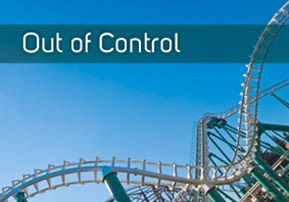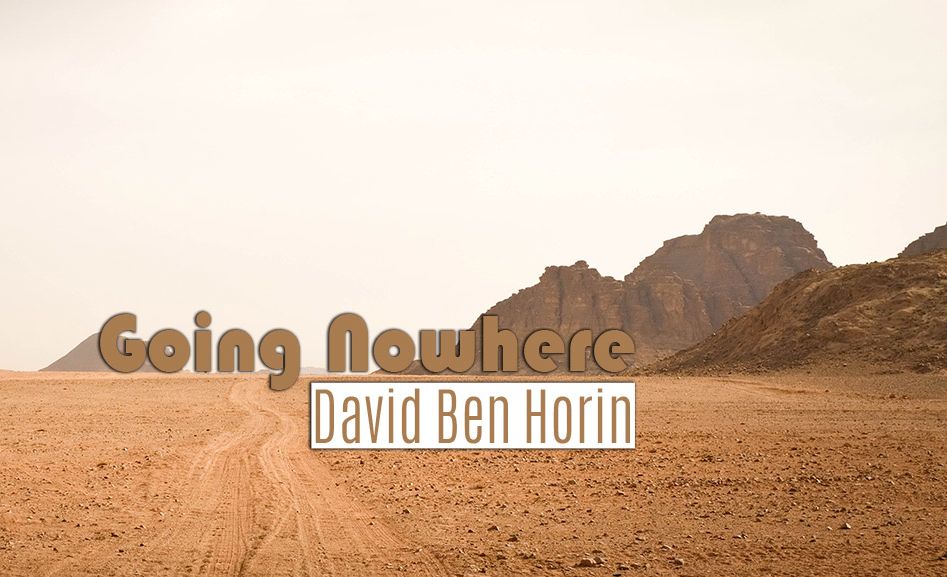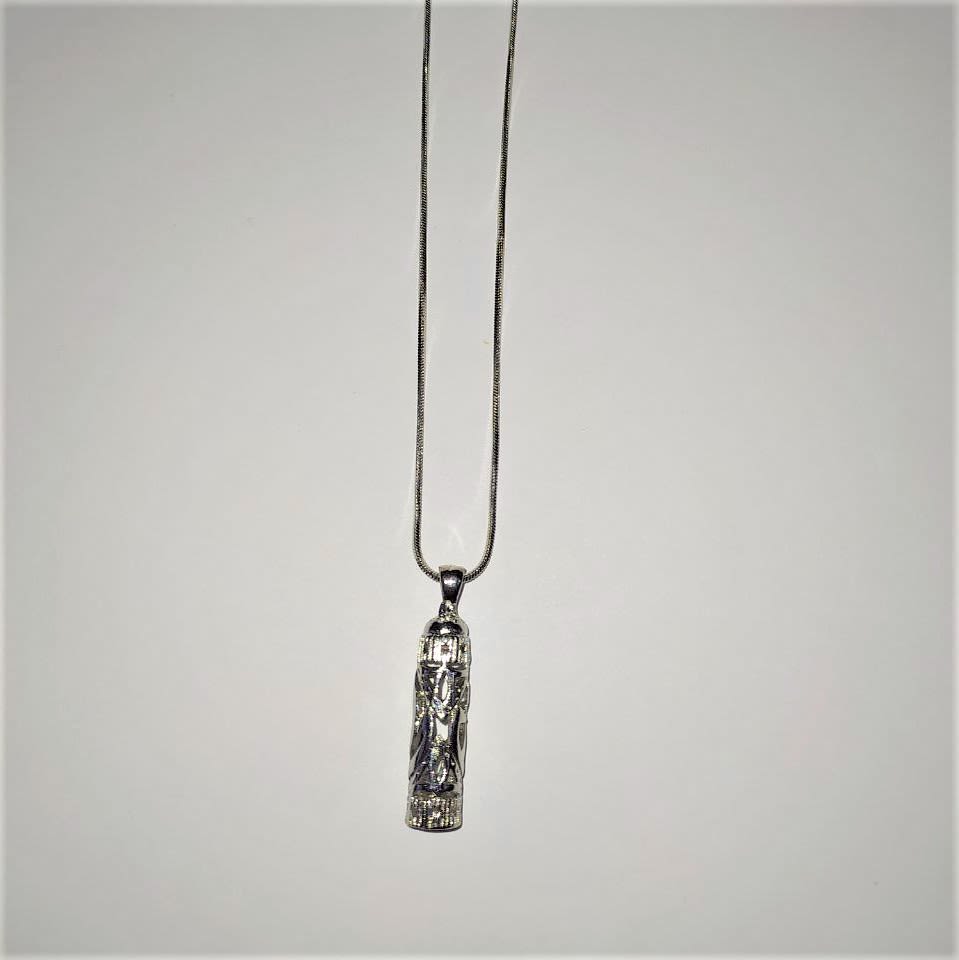
Out of Control
Feeling as if we run the world is also a total illusion. We all see day after day that things never go as planned - so why do we still plan for things to go our way?

I hate roller coasters. I mean, really, really hate them. There is no realistic sum of money that would convince me to ride one (well, maybe if it’s in the seven figure range, but who could say that’s realistic?). Even the  children’s roller coaster frighten me. I remember the last time I rode Splash Mountain in Disney World – I was the only one practically crying for my mommy when I got off the ride! Even the 8-year-olds were laughing and pointing fingers at me! But, seriously, can I blame them? Back when I used to have a TV, I remember watching shows like the “Top 10 Craziest Roller Coasters” and being dumbfounded by the fact that anyone would willingly put themselves in what to me would feel like a near-death situation. So for all of you thrill-seekers out there, wow, do I think you’re loony!
children’s roller coaster frighten me. I remember the last time I rode Splash Mountain in Disney World – I was the only one practically crying for my mommy when I got off the ride! Even the 8-year-olds were laughing and pointing fingers at me! But, seriously, can I blame them? Back when I used to have a TV, I remember watching shows like the “Top 10 Craziest Roller Coasters” and being dumbfounded by the fact that anyone would willingly put themselves in what to me would feel like a near-death situation. So for all of you thrill-seekers out there, wow, do I think you’re loony!
Now that I have managed to offend almost all of the readers, please accept my sincerest apologies. This article is not meant to bash thrill-lovers. I am pointing out my aversion to anything even remotely palpitation-inducing for a reason. Recently I read Chaya Golda Ovadia’s great article called “Blackout”. When I got to the part about her feeling dizzy and fainting, it really struck a nerve with me. Those feelings of anxiety and nervousness started to emerge from the deep crevices of my being, showing me that in fact I had not banished them as I had previously thought. But this is a good thing. As I asked Hashem to strengthen my emuna, which was still clearly weak in this area, for the thousandth time I tried to connect the dots. What was it about fainting or feeling dizzy that drove me into high-anxiety mode? What was Hashem trying to tell me? For years I had tried to rationalize my fear away, I had tried to talk myself out of a seemingly endless moment of panic, or I had just succumbed to the panic. Every time I had felt slightly “off”, the alarm would go off in my head. What in the world was the connection?!
And, FINALLY, after asking and begging Hashem for the answer, in His loving mercy He gave it to me. The dizziness triggered a panic attack because I was afraid of feeling out of control! Sure, you might say that’s obvious, but we know that solutions are always more obvious to anyone who is not living through the difficult situation. So what was the message Hashem was telling me? It was: “My beloved daughter, surrender your desire to control your life. Let Me take over, and I promise that you will have a life filled with unlimited blessings.” Wow! What a slap-to-the-forehead moment! That was the answer I was looking for! See how tricky the Yetzer Hara, or Evil Inclination, is! I was trying to be in control of my life, and the moment I felt out of control, I couldn’t deal!
So, you may ask, “Why is it necessary to know that I’m not in control of my life? What’s the harm in wanting to make my own decisions, or thinking that my sustenance is a result of my hard work?” These are good questions. To begin my explanation, I would like to first examine Rebbe Nachman’s zt”l concept of “Self-Nullification”. In his famous work, Sichot HaRaN, Rebbe Nachman explains to his greatest disciple, Rebbe Natan zt”l, the idea and process of self-nullification: “When things are very bad, nullify yourself completely.” Rebbe Natan asks how one might accomplish this, to which Rebbe Nachman responds, “Close your mouth and close your eyes- this is nullification!” Rebbe Natan goes on to explain: “When the Evil One overwhelms us and disturbs us with all sorts of evil thoughts and confusions that we cannot seem to overcome – that is when we should nullify ourselves.”
There are several points to be understood here. First, we must realize that there is a dark angel whose only task is to draw us into the bottomless pit of confusion and misery, leading us to practically sever the connection we have with our Creator. Second, we should know that we are only human, and will never be able to defeat this angel on our own. So what should we do? Rebbe Nachman provides the answer in one word- hitbodedut, or personal prayer. This is our most powerful tool to overcome the negative thoughts that bombard and strike us like deadly spiritual bullets. How does hitbodedut work? Our prayers summon Hashem, The Ultimate Knight in Shining Armor, to the rescue. Who better to beat an angel than Him, The One Who created that angel in the first place?
When Rebbe Nachman says we should close our mouth and our eyes, I take it to mean that we should do our best to seal all of the gates that lead to our brains, so the negative thoughts can’t get in. Maybe we should also cover our ears and yell, “I can’t hear you!” in a really nagging tone. Hey, whatever works! Furthermore, the act of closing our mouth and our eyes really is the ultimate physical way to nullify ourselves. If we can’t see, are we aware of anything that exists around us? If we can’t speak, can we interact with anyone near us? How about spiritually? By nullifying ourselves, we are actually nullifying our egos. What does the ego want? It wants us to think or behave in a self-serving way. For example, if things don’t go my way, I get upset. If my spouse isn’t attentive enough to me, I get upset. If my kids are acting up, I get very upset! So, when I think about it, either way I’m not in control! Either the ego is telling what to do and what to think, or Hashem is running the show. It’s like a spiritual game of “Monkey in the Middle”, but with a twist- I get to pick which side is pulling me.
Now that we can see that we have two opposite forces vying for influence over our minds, we can better understand why it is indeed harmful for us to think we are in control of our lives. To better illustrate this point, allow me to lead you through a typical day for a typical guy- let’s call him Bob. Bob is a decent guy- he’s married, has two kids, and has a job that allows him to live comfortably. One day, Bob’s alarm doesn’t go off, and he wakes up late and in a bad mood. As he frantically dresses and grabs his bagel on the way out the door, he accidentally forgets his wallet. While zig-zagging through traffic on the way to work, he gets pulled over for reckless driving. Oops, where’s the wallet? That’s four points on the license. With the smoke from his anger shooting out of his ears, he barely manages to keep calm as he bolts through the door to his office. Oh, no, Bob, watch out for the guy with the….hot coffee! Right through Bob’s shirt it went! Poor Bob hasn’t even made it to his desk yet, and already he’s had quite a morning! Let’s look at this from Bob’s perspective, which is one without what Rabbi Brody likes to call “Spiritual Awareness”. Bob sees himself as a victim of a random sequence of events, which all happen to seem negative. His victim-mentality kicks in, and he wonders what he did to deserve this. Who is in control of his mind? The dark angel? You bet! He’s feeding Bob all sorts of lies to make Bob justify that life is indeed unfair. This pulls Bob just another step further from recognizing the hand of G-d in his life. What if Bob had read The Garden of Emuna or Trail to Tranquility? Well, for one thing, he would be a lot less angry! Maybe Bob would take a step back and try to see the morning through spiritually aware eyes. First, he may realize that every situation comes from G-d, so this morning had to happen for a reason. Then, he may try to understand what that reason is- maybe he owed a tremendous spiritual debt, and his Loving Father cut him a deal. For example, what if Bob were destined to be in a car crash that morning? But his Loving Father didn’t want that to happen, so He made Bob wake up late and get on the road late. Instead of a car crash, Bob had to suffer through a traffic ticket and a coffee stain on his shirt. If he could imagine this scenario, he would be thanking G-d for the crazy morning! Now that’s real emuna! Great job, Bob! What is the point of this story? Either way, Bob had no control over his morning. The only thing he had control over was how he was going to react to the challenges.
Let’s look at another way feeling in control can harm a person. If a person were to constantly feel like he was in control of every decision without having any negative consequences, he would quickly become arrogant and cruel to others. What would motivate such a person to be nice and considerate if he feels like he’s the only one directing his life? Who does he feel the need to answer to? This self-serving mentality is what leads to people stepping on each other, especially with regards to relationships and business transactions. For example, if a person thinks his livelihood is a result of his “hard-earned money”, he’s got a rude awakening coming. Rav Arush explains in his book, The Garden of Riches, that such a person will eventually come to lose that money if he doesn’t recognize that it is a gift from Hashem. If a wealthy person really understood that the money he has is not only meant for his own benefit, don’t you think he would behave differently? If he really knew he was given the money because he has a tremendous responsibility to use it to help others, do you think he would be as wasteful with it?
In such cases, the wake-up calls have to be pretty loud. A person who lives his life believing he is running the show is actually a slave to his ego. Hashem doesn’t want us to be slaves or puppets, so He sends us difficulties in the exact areas that we need to free ourselves from the clutches of the dark angel. Each of us has an area that triggers a sense of nervousness or anxiety. This is the stimulus Hashem is using to bring us out of our “I’m in control” fairy tale. Moments of anxiety are actually a big blessing, because they are clear signs of weak emuna. Without them, we would never know that our emuna is weak in certain areas. Then how would we ever fix them? I find that in times of stress, a mantra is really helpful. In this particular case, if you have a moment when you’re feeling out of control, just repeat, “I surrender, I surrender, I surrender”, until you’re actually surrendering! Remember, the tough situations will help you to strengthen your emuna if you nullify your will to The Creator’s will.
Feeling as if we run the world is also a total illusion. In this area, too, we must surrender our need to control our lives. We all see day after day that things never go as planned- so why do we still plan for things to go our way? Why don’t we just save ourselves the headache and plan for things to go according to Divine Will? We do what we can, and leave the result up to G-d! In challenging, stressful situations, whether on a roller coaster or in real life, remember- you’re not in control, so sit back, relax, and enjoy the ride!












3/01/2011
great article-really spoke to me Wow, I have heard this and read it before but you really presented it in a way that talks to me. Thank you so much
3/01/2011
Wow, I have heard this and read it before but you really presented it in a way that talks to me. Thank you so much